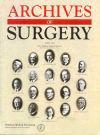Could the endo-first strategy really be better?
引用次数: 1
Abstract
sion. Danczyk et al 1 hypothesized that failed endovascular AIOD procedures lead to worse outcomes when converted to open surgery and review their 12-year experience. To my surprise, and I suspect somewhat to theirs, this turns out not to be the case. In fact, survival and outcomes of the secondary open operations are actually better than those of primary open operations (5-year survival, 67% vs 48%). Although there may be numerous explanations for this observation that the authors acknowledge is counterintuitive, one of the takeaway messages of this article is that secondary open conversion after failed AIOD endovascular treatment is at least not worse. Unlike failed infrainguinal endovascular interventions that often lead to higher rates of amputation, failed endovascular AIOD treatments were not associated with this. To answer the question I pose in the title, this article providescompellingevidencethatforinflowdisease,endovascular interventions should be the preferred initial route. In terms of patency, durability, patient comfort, and physician comfort, iliac stenting is at least as good as, if not better than, aortofemoral bypass. We now have evidencethat,evenifthereissomefearoflong-termconsequencesfromiliacstentingshoulditfail,theopenconversion is not worse than initial primary open operations. The endo-first, and many times an endo-second and endo-third, approach for AIOD is justified for most patients, and this strategy, even if it fails, is not hurting patients or their long-term outcomes.内优先策略真的会更好吗?
本文章由计算机程序翻译,如有差异,请以英文原文为准。
求助全文
约1分钟内获得全文
求助全文

 求助内容:
求助内容: 应助结果提醒方式:
应助结果提醒方式:


